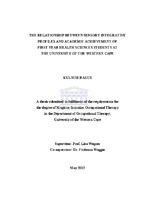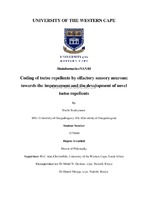| dc.contributor.advisor | van Rensburg, Viki Janse | |
| dc.contributor.author | Pillay, Sarosha | |
| dc.contributor.other | NULL | |
| dc.contributor.other | Faculty of Science | |
| dc.date.accessioned | 2014-02-07T07:35:05Z | |
| dc.date.available | 2010/05/03 02:12 | |
| dc.date.available | 2010/05/03 | |
| dc.date.available | 2014-02-07T07:35:05Z | |
| dc.date.issued | 2008 | |
| dc.identifier.uri | http://hdl.handle.net/11394/2774 | |
| dc.description | Magister Scientiae (Occupational Therapy) - MSc(OT) | en_US |
| dc.description.abstract | Children with autism typically present with sensory processing difficulties that affect their ability to relate to people. This qualitative study focused on exploring the sensory processing of children with autism and their mothers, using a frame of reference of sensory integration theory. The purpose of the study was to help mothers gain knowledge and understanding into their own sensory processing so that they could develop a better understanding of their child's sensory processing in order to facilitate better mother-child relationships. An evaluation tool, the Sensory Profiles by Dunn (1999) and the Adolescent/Adult Sensory Profile by Brown & Dunn (2002) was used as the instrument for gathering information on sensory processing. The population consisted of ten sets of mothers and their children with autism who attend Vera School for Learners with Autism. The Sensory Profiles was completed to investigate the phenomenological issues regarding the sensory modulation aspects of the parent-child relationship. Each mother received individual feedback on their own and their child's sensory processing. Two focus groups were then conducted with the mothers to determine the value of the information gained from the profiles. Data consisted of two audio taped feedback from the focus group. Data was analysed for emerging themes. The three major themes that emerged were, (a) You realize how similar you are to your child, (b) I also have needs (c) They walk away and leave you with this wreck of a child. The findings of the study suggest that an understanding of sensory processing can influence the mother-child relationship positively. | en_US |
| dc.language.iso | en | en_US |
| dc.publisher | University of the Western Cape | en_US |
| dc.subject | Autism | en_US |
| dc.subject | Sensory integration theory | en_US |
| dc.subject | Sensory integration dysfunction | en_US |
| dc.subject | Sensory profile | en_US |
| dc.subject | Adolescent/adult sensory profile | en_US |
| dc.subject | Sensory modulation | en_US |
| dc.subject | Occupational therapy | en_US |
| dc.subject | Mother-child relationship | en_US |
| dc.subject | Neurobehaviour | en_US |
| dc.subject | Qualitative methods | en_US |
| dc.title | Exploring the sensory compatibility of ten children with autism and their mothers | en_US |
| dc.type | Thesis | en_US |
| dc.rights.holder | University of the Western Cape | en_US |
| dc.description.country | South Africa | |




